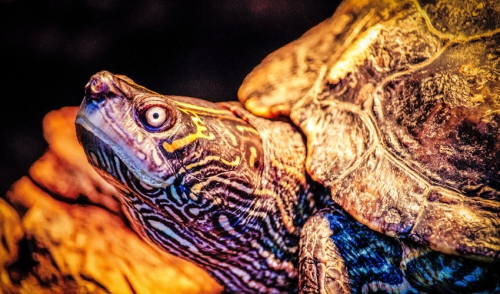10 Symptoms of Diabetes in Dogs
Diabetes can be a challenging condition to manage, especially in pets that cannot verbally communicate how they feel. Recognizing the symptoms of diabetes in...

A turtle’s shell is a critical part of its anatomy, and the shell needs proper care to keep your turtle healthy. Understand the shell and how to care for it safely and effectively is essential for every turtle or tortoise owner.
What Is a Turtle’s Shell?
The shell of a turtle is more than just a covering, it is part of the animal’s skeleton and is made up of fused bones, including a number of ribs, the spine and the breastbone. The back of the shell is called the carapace, and the belly of the shell is called the plastron. Blood vessels and nerves run through the shell, and it protects the turtle’s vital organs. The bones of the shell are covered with a thick layer of skin and hard layers of keratin, the same protein found that makes up hair and fingernails. These outer layers of keratin, called scutes, will be shed as the turtle grows and new scutes are formed, and they protect the turtle from bruises and scrapes. A turtle does not ever completely shed its shell, however, and cannot be removed from its shell.
Problems With Turtle Shells
Just as other animals can develop problems with their fur and skin, turtles can develop problems with their shells. Shell rot is caused by bacterial or fungal infections. Uneven growth of the scutes can cause pyramiding of the shell, which is a deformed shape, and shells can be cracked, split, chipped or broken just as bones can be. Symptoms of turtle shell problems include…
Turtle shell problems can have many causes, from improper care to a poor diet to accidental injuries. Lack of calcium, a dirty environment, inadequate sunlight and excessive moisture can also cause irregularities in a turtle’s shell. When problems are noticed, it is important to take your turtle to the veterinarian right away for proper diagnosis and treatment.
Caring for Your Turtle’s Shell
Fortunately, it is easy to provide good turtle shell care to keep your reptile friend healthy, and good general turtle care minimizes the risk of shell problems.
By providing proper turtle shell care, you can minimize the risk of any problems that can hurt your turtle or tortoise. If problems do occur, however, it is important to be patient. Turtles can heal but it is a slow process that requires dedicated care to be sure they get the right treatment. Check with your veterinarian regularly to keep your turtle’s shell in good shape, and your pet will have a long, happy, healthy life.
We are constantly adding new specials to our site. Be sure to check back often!
We currently do not have any events scheduled.

Diabetes can be a challenging condition to manage, especially in pets that cannot verbally communicate how they feel. Recognizing the symptoms of diabetes in...
Comments